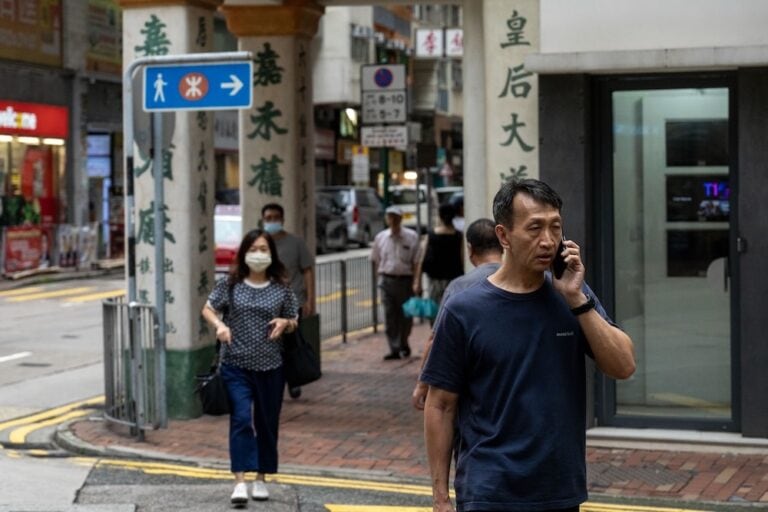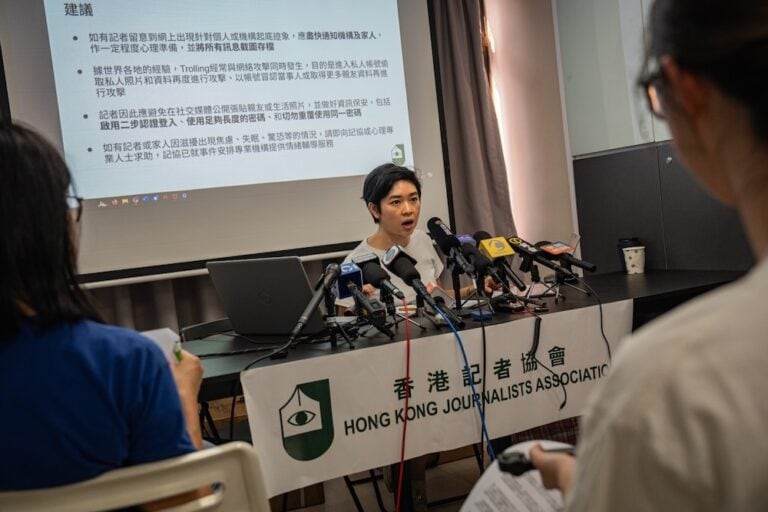To raise awareness of the need to safeguard press freedom in Hong Kong, the HKJA with the help of a group of consultants, designed a scientific research method to collect data to produce the first Hong Kong Press Freedom Index.
According to recent international surveys, press freedom in Hong Kong is deteriorating. To raise awareness of the need to safeguard press freedom in Hong Kong, the Hong Kong Journalists Association (HKJA) with the help of a group of consultants comprising of academics, designed a scientific research method to collect data to produce the first Hong Kong Press Freedom Index. The index of the general public is 49.4 while the journalists is 42.0.
The Index rate ranges from 0 and 100. The Index shows that the level of press freedom in Hong Kong is low. Data collection for the Index was made before the attack on Mr Kevin Lau, former Chief Editor of Ming Pao and the sudden termination of Ms Li Wei Ling’s employment contract as a talk-show host by Hong Kong Commercial Broadcasting Co. This shows that press freedom in Hong Kong is much worse than shown by the Index. HKJA urges the Hong Kong Government to maintain a high degree of transparency and to lift restraints on the media so as to protect Hong Kong’s status as an information hub. Most important of all, enactment of freedom of information legislation cannot be delayed any longer.
To monitor the change of press freedom in Hong Kong, HKJA will conduct the survey regularly. The public will understand to what extent they enjoy press freedom in Hong Kong, a freedom enshrined in the Basic Law, through changes in the Index.
The HKJA Press Freedom Index Survey had two groups of target respondents. The first was the general public for which a survey was conducted through random sampling telephone interviews between 20th to 30th December 2013 in which 1,018 respondents were successfully interviewed. The second part was conducted among journalists with questionnaires distributed to journalists by HKJA between 23 Dec 2013 and 4 Feb 2014. A total of 422 respondents were successfully interviewed.
HKJA commissioned the Public Opinion Programme (POP) at the University of Hong Kong to conduct the general public survey. At the press conference to announce the Index, consultant group member, Prof. Clement So, Professor of the School of Journalism & Communication, CUHK, explained the process and theory behind the formulation of the Index. Another consultant group member, Dr Robert Chung, Director of POP, HKU explained the methodology of the survey.
By analysing the rates of individual questions, it was found that there is a difference between the general public’s and journalists’ perceptions of the enjoyment of press freedom. For example, when asked about their satisfaction with press freedom in Hong Kong (with 10 being very satisfied, 0 being very dissatisfied), the average rate for the general public is 6.3, while for journalists it is 4.8.
On the question of Hong Kong Government’s performance in releasing information of important concern to the general public (10 represents very good, 0 represents very bad), the rate for the general public and journalists is 5.0 and 3.7 respectively. This shows that journalists are very dissatisfied with the way the HK Government releases important information of public concern.
In addition, the survey throws light on the situation of self-censorship amongst media personnel. The interviewees were asked about self-censorship in Hong Kong news media (10 represents very common self-censorship situation, 0 represents no self-censorship). The rate for the general public and journalists is 5.4 and 6.9 respectively. This suggests that, from the view of journalists, self-censorship is common within the Hong Kong media.
The questionnaire also asked journalists for their response towards officials under the Principal Officials Accountability System during media enquiries (10 represents truthful answers, 0 represents evasive answers). 74% interviewees gave the rate of between 0 and 4. The average rate is 3.1. In the eyes of journalists, the principal officials are far from speaking frankly and sincerely. On the question of whether the HK Government would come out to protect press freedom if the threat was dire, 71% interviewees replied with either “probably not” or “definitely not”.
The HKJA would like to express our sincere appreciation of the unstinting and generous help of the consultant group, without which the first Hong Kong Press Freedom Index would not be in existence today. The consultant group members are:
– Ms Mak Yin Ting (Former Chairperson, HKJA)
– Mr Ken Lui (Convenor, HKJA Press Freedom Subcommittee)
– Prof Clement So (Professor, School of Journalism & Communication, CUHK)
– Prof Lisa Leung (Associate Professor, Department of Cultural Studies, Lingnan University)
– Mr Wong Tin Chi (Senior Lecturer, School of Communication, HKBU)
– Prof Sing Ming (Associate Professor, Division of Social Science, HKUST)
– Dr Robert Chung (Director of POP, HKU)
Hong Kong Journalists Association
23 April 2014


